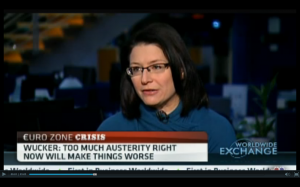February 13, 2012 -As violence erupted in Greece, I guest-hosted CNBC’s Worldwide Exchange talking about economic policy challenges. Watch the video by clicking on the image below:

I’ve been arguing that Europe needs an orderly debt restructuring for Greece to avoid much worse consequences. There’s video below of my guest host appearance on CNBC’s Worldwide Exchange with Nicole Lapin May 23, 2011, discussing the challenges facing Europe as it struggles with Greece’s debt crisis.
A CNBC follow-up article, “Will Eurobonding Save the Day?” further discussed a proposal which I support -originally made by the Brussels-based think tank Bruegel- to pool European debt into a more liquid Euro-bond. Actually, it would involve two kinds of Euro-bonds: senior “Blue bonds” representing debt under 60% of each nation’s GDP, and junior “Red bonds,” for higher amounts, which would trade at much higher yields reflecting the increased risk. The Bretton Woods Project also has cited my argument for an orderly pre-emptive default in a June 13 article, “IMF’s European Austerity Drive Goes On Despite Failures and Protests“
Today’s debt crises among European sovereigns and US underwater mortgage holders both have much in common with a similar chronicle of debt foretold in Argentina a decade ago: the answer that involves the least amount of pain is a swift restructuring. In “Chronicle of a Debt Foretold,” a new paper for the World Economic Roundtable, organized jointly by the World Policy Institute and the Economic Growth Program of the New America Foundation, I argue that the answer is similar to the stitch in time that was proposed for Argentina, on which policy makers failed to act, modeled on the Brady Plan debt restructurings that resolved the 1980s sovereign debt crisis. We need a new Brady Plan for both the troubled European sovereign debtors, and for US underwater mortgages, before we lose another decade, as we did in the 1980s.